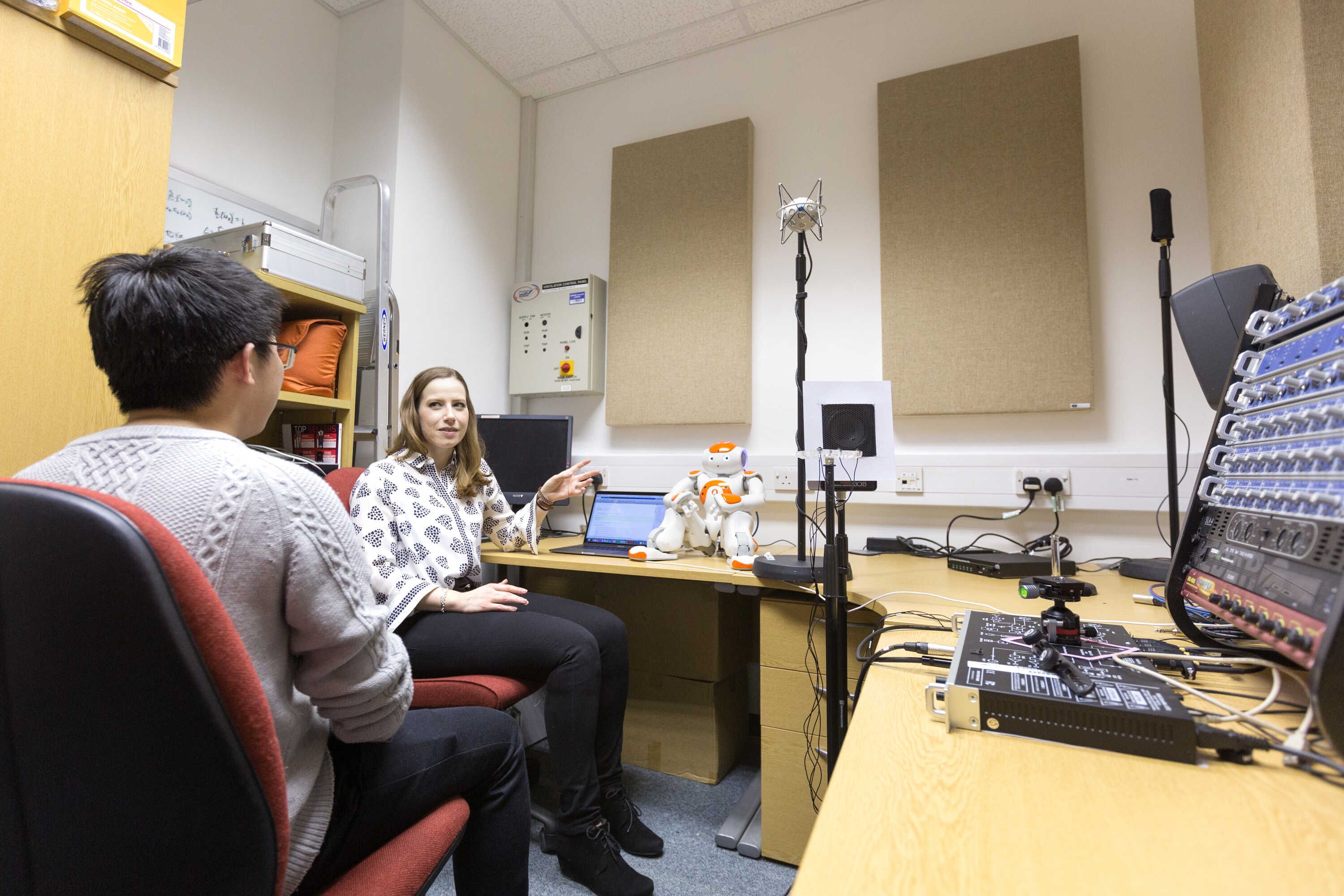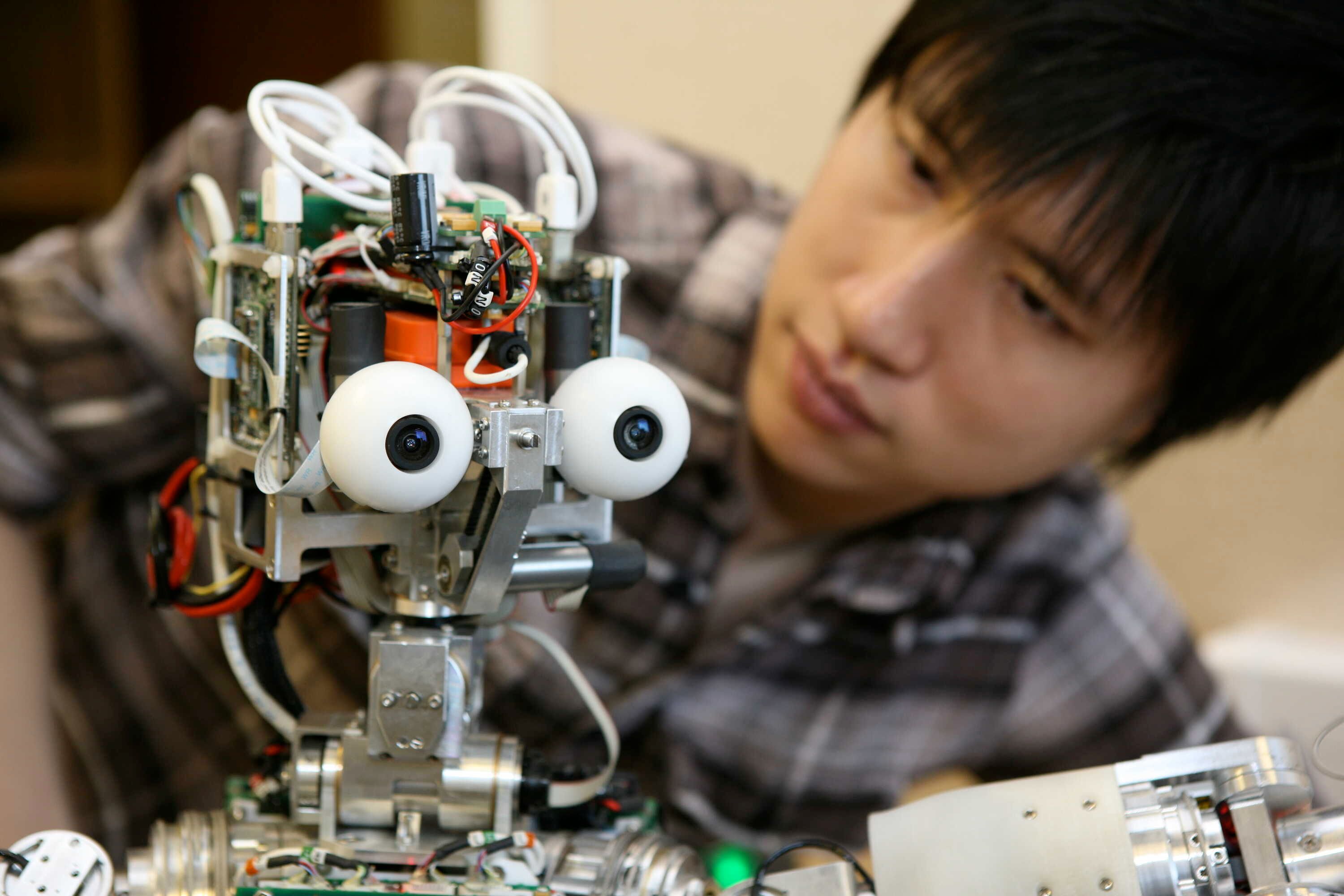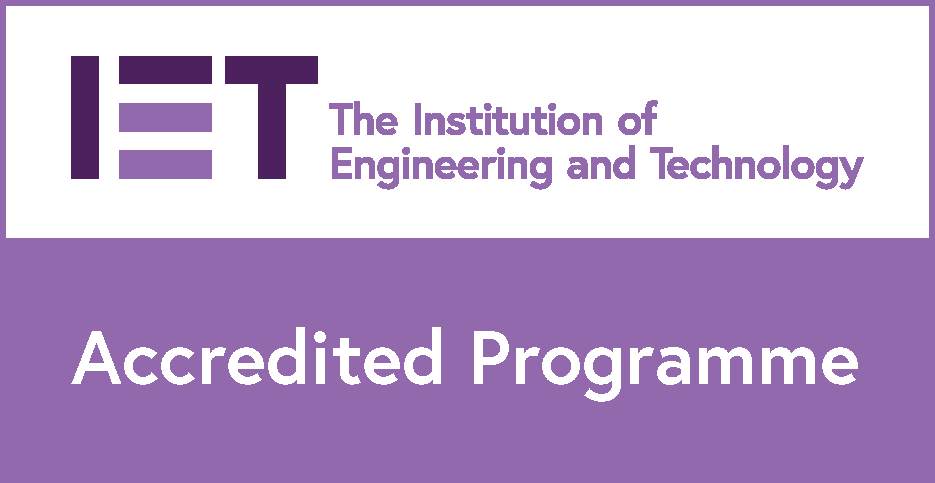
Communications and Signal Processing
Develop an in-depth knowledge of modern information engineering problems and their solutions.
Develop an in-depth knowledge of modern information engineering problems and their solutions
Get industry recognition by achieving an accredited degree, awarded by the Institution of Engineering and Technology
Apply computational principles to solve communication and signal processing problems
Course key facts
Qualification
MSc
Duration
1 year
Start date
September 2025
Study mode
Full-time
-
Fees
£18,500 Home
£42,900 Overseas
Delivered by
Location
-
South Kensington
-
Minimum entry standard
First-Class Honours (minimum of 75% overall) in Electrical/Electronic Engineering or a related subject with a substantial Electrical/Electronic Engineering component
Course overview
Explore the theoretical and practical solutions that can help overcome problems at the forefront of communications and signal processing on this course.
You'll examine mobile communications in a world moving towards 5G, key aspects of wireless communication, and gain insights into the challenges of modern day signalling and processing.
Learning is delivered through a blend of lectures, tutorials and practical laboratories, which will provide you with an in-depth knowledge in-depth knowledge and critical awareness of a subject area that forms the basis of modern information engineering.
You'll also complete a substantial individual research project in an area of your interest.
The knowledge and skills you’ll gain on this course, will give you the opportunity to enter a wide range of industries including communication, signal and image processing, machine learning and finance or go into further research.
Structure
This page is updated regularly to reflect the latest version of the curriculum. However, this information is subject to change.
Find out more about potential course changes.
Please note: it may not always be possible to take specific combinations of modules due to timetabling conflicts. For confirmation, please check with the relevant department.
You'll take all of the following core modules.
Core modules
Analyse the design of digital filters and in multirate signal processing techniques.
Engage with crucial cutting-edge topics for current and future (5G and beyond) multi-antenna wireless communication systems.
Gain the analytical skills required to study random phenomena in engineering systems and learn how to set up probabilistic models for engineering problems.
Explore the theoretical basis and applicability of modern methods for spectral estimation, algorithms which underlie adaptive signal processing, and machine intelligence techniques.
Learn best practice in experimental work and gain practical exposure to real systems.
Professional accreditation
Accredited by the Institution of Engineering and Technology (IET) on behalf of the Engineering Council as meeting the requirements for Further Learning for registration as a Chartered Engineer. Candidates must hold a CEng accredited BEng/BSc (Hons) undergraduate first degree to fully meet the CEng registration educational requirements.
Our accreditation agreement with the Institution of Engineering and Technology is renewed every 5 years, and the current agreement runs between 2019 and 2025.
Teaching and assessment
Balance of teaching and learning
Key
- Lectures and classes
- Laboratory work
- Research project
- 40% Lectures and classes
- 20% Laboratory work
- 40% Research project
Teaching and learning methods
-
Lectures
-
Seminars
-
Virtual learning environment
-
Problem-solving classes
-
Software laboratory
-
Individual and group projects
-
Independent study
Balance of assessment
Key
- Coursework
- Examinations
- Practical
- 50% Coursework
- 40% Examinations
- 10% Practical
Assessment methods
-
Coursework
-
Written exams
-
Oral presentations
-
Poster presentations
-
Reports
-
Individual research project
Entry requirements
We consider all applicants on an individual basis, welcoming students from all over the world.
First-Class Honours (minimum of 75% overall) in Electrical/Electronic Engineering or a related subject with a substantial Electrical/Electronic Engineering component
How to apply
Apply online
You can submit one application form per year of entry. You can choose up to two courses.
Application deadlines – Round 3 closes on Thursday 15 May 2025
We operate a staged admissions process with several application rounds throughout the year.
Apply by 23.59 (UK time) on the closing date of an application round, to ensure you receive a response on your application by the relevant decision date.
Application rounds
Round 1
- Applications open on Friday 27 September 2024
- Applications close on Thursday 16 January 2025
- Decision by Thursday 6 March 2025
Round 2
- Applications open on Friday 17 January 2025
- Applications close on Thursday 27 March 2025
- Decision by Thursday 1 May 2025
Round 3
- Applications open on Friday 28 March 2025
- Applications close on Thursday 15 May 2025
- Decision by Thursday 17 July 2025
There is no application fee for MRes courses, Postgraduate Certificates, Postgraduate Diplomas, or courses such as PhDs and EngDs.
If you are applying for a taught Master’s course, you will need to pay an application fee before submitting your application.
The fee applies per application and not per course.
- £80 for all taught Master's applications, excluding those to the Imperial College Business School.
- £100 for all MSc applications to the Imperial College Business School.
- £150 for all MBA applications to the Imperial College Business School.
If you are facing financial hardship and are unable to pay the application fee, we encourage you to apply for our application fee waiver.
Find out more about how to apply for a Master's course, including references and personal statements.
An ATAS certificate is not required for students applying for this course.
Fees and funding
Home fee
2025 entry
£18,500
You should expect and budget for your fees to increase each year.
Your fee is based on the year you enter the university, not your year of study. This means that if you repeat a year or resume your studies after an interruption, your fees will only increase by the amount linked to inflation.
Find out more about our tuition fees payment terms, including how inflationary increases are applied to your tuition fees in subsequent years of study.
Whether you pay the Home or Overseas fee depends on your fee status. This is assessed based on UK Government legislation and includes things like where you live and your nationality or residency status. Find out how we assess your fee status.
If you're a UK national, or EU national with settled or pre-settled status under the EU Settlement Scheme, you may be able to apply for a Postgraduate Master’s Loan from the UK government, if you meet certain criteria.
For courses starting on or after 1 August 2024, the maximum amount is £12,471.
The loan is not means-tested and you can choose whether to put it towards your tuition fees or living costs.
How will studying at Imperial help my career?
Electrical and electronic engineering graduates at Imperial are highly sought after in a wide range of sectors.
These include electrical engineering, computer engineering and computer science.
Other potential career paths include consultancy, finance, or management.
Our graduates often pursue further study in master's programs or doctoral research.
Further links
Contact the department
- Telephone: +44 (0)20 7594 3123
- Email: eee.pgadmissions@imperial.ac.uk
Course Director: Dr Tania Stathaki
Visit the Department of Electrical and Electronic Engineering website.

Request info
Find out more about studying at Imperial. Receive updates about life in our community, including event invites and download our latest Study guide.

Events, tasters and talks
Meet us and find out more about studying at Imperial.

Terms and conditions
There are some important pieces of information you should be aware of when applying to Imperial. These include key information about your tuition fees, funding, visas, accommodation and more.
You can find further information about your course, including degree classifications, regulations, progression and awards in the programme specification for your course.
Programme specifications